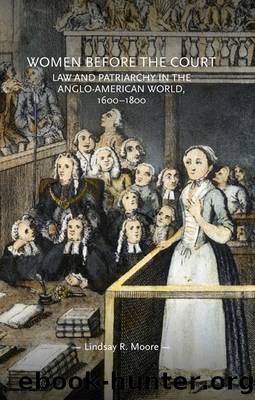Women before the court by Lindsay R. Moore

Author:Lindsay R. Moore [Moore, Lindsay R.]
Language: eng
Format: epub
Tags: Law, Legal History, Gender & the Law, History, Women, Social Science, Women's Studies
ISBN: 9781526136350
Google: iXS5DwAAQBAJ
Publisher: Manchester University Press
Published: 2019-05-10T22:34:03+00:00
After her second petition, the Salem magistrates allowed Beatrice to live separately from her husband. She died in 1683 with an inventory of goods worth £181.17
While obtaining a full divorce was rarely an option in colonial Maryland, wives did seek to live separately from their husbands and to secure financial maintenance from them. In one such case Elizabeth Tennyson, wife of John Tennyson, petitioned the Council of Maryland on 25 October 1680. Elizabeth appeared in person before the members of the council, explaining that she could not live with her husband and asking that he give her maintenance so she could live separately. In making her statement before the council, Elizabeth said that she âcould not live peaceably and quietly with him, but with a great deal of danger and hazard to her personâ, and asked the council to allow her âcompetence maintenanceâ. The council summoned John Tennyson to appear and answer Elizabeth's complaints. Though he denied Elizabeth's allegations of severe abuse, he did admit that he could ânever entertain that love and respect of his said wife or neither afford her that countenance in his house as is property due from a man to his wifeâ. The justices therefore ordered that separate maintenance be awarded to Elizabeth to live apart from her husband. The household goods included Elizabeth's âowne bedâ with its furniture, all of her clothes and a yearly maintenance of three barrels of corn, 300âlb of meat and 1,000âlb of tobacco for the remainder of her life.18
Unlike Massachusetts, which had tight-knit communities that acted as a surveillance system for misbehaviour, the population of colonial Maryland was spread over a wide area, making it easy for a husband to disappear without any common knowledge of his whereabouts. Sarah Harris petitioned the Council of Maryland in 1683, complaining that her husband had abandoned her and her five children âfor the most part of the yeare except the dead of the winterâ. She alleged that her husband contributed nothing to the maintenance of the household, so that she feared that she and her children would starve or fall on the poor rates unless some action was taken. When the weather turned colder, her husband stayed in the household and âhath eaten up all ⦠the childrens maintenance, which she all the yeare provides for the keeping of themâ. The authorities who heard Sarah's petition referred it to be decided by the Lord Proprietary and the General Assembly, which was advised to provide relief for the defendant with âall convenient speedâ.19
The willingness of magistrates to support wivesâ petitions for separation and maintenance is a remarkable example of the law's power within the patriarchal family. When relationships between husbands and wives collapsed, the law provided the only assurance of equity and justice that women could expect to receive.
Download
This site does not store any files on its server. We only index and link to content provided by other sites. Please contact the content providers to delete copyright contents if any and email us, we'll remove relevant links or contents immediately.
Tor and the Dark Net · Remain Anonymous Online and Evade NSA Spying (Tor, Dark Net, Anonymous Online, NSA Spying) by Smith James(206)
The Love Conspiracy: An Age-Gap Lesbian Romance by Arias J.J(169)
Carl Schmitt Between Technological Rationality and Theology by Hugo E. Herrera;(158)
If We Burn by Vincent Bevins(150)
Women before the court by Lindsay R. Moore(120)
Witches, Wife Beaters, and Whores by Elaine Forman Crane(106)
Covering Muslims by Erik Bleich;A. Maurits van der Veen;(105)
Defensive Nationalism by B. S. Rabinowitz;(105)
The Crimes of Womanhood by A. Cheree Carlson(102)
The Will to Punish by Fassin Didier;Kutz Christopher;(101)
Sexual Violence in Conflict and Post-Conflict Societies by unknow(99)
Defining Girlhood in India by Ashwini Tambe(99)
To Raise and Discipline an Army by Joshua Kastenberg(97)
Critique of the Legal Order by Richard Quinney Randall G. Shelden(95)
Police Matters by Radha Kumar(92)
International Humanitarian Law and Justice by Mats Deland Mark Klamberg Pål Wrange(90)
A New Daddy by orphan_account(90)
Advisory Boards in Medium-Sized Companies by Daniel Graewe(87)
History and Power in the Study of Law by June Starr Jane F. Collier(85)
